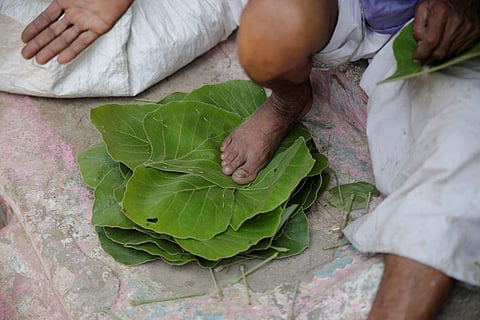

The fallouts of the new Goods and Services Tax (GST) regime that intended to simplify taxation in India, have become evident weeks after it was imposed on July 1.
Sal Leaf, a minor forest produce (MFP) that forest-dwelling communities can collect and trade, has been taxed 18 per cent. Tribal communities in Odisha whose sustenance depends on collection of Sal leaf and making plates out of them, are directly affected. According to experts working on the issue, around 1.5 million people depend on collection of Sal leaves for sustenance.
Earlier, these plates were exempt from Value Added Tax or exercise tax in the state; only a royalty of Rs 72 per quintal of leaves was to be given to the forest department. This additional economic burden has invariably hurt the trade of Sal leaf plates.
The gravity of the situation has also been recognised by the state government. On August 21, the state’s finance minister Shashi Bhusan Behera wrote to the Union Minister of Finance, Arun Jaitley, urging him to exempt Sal leaf and its products from the GST.
While the tax has to be paid by the trader, Chitta Ranjan Pani of Vasundhara, a non-profit working on tribal rights in Odisha, says that the traders, to cut cost, have been transferring the burden of the tax to the leaf collectors. The trade of the plates, meanwhile, has gone down to the doldrums.
“When we are trying to sell the Sal leaf plates to traders, they are reluctant to buy and cite various reason best known to them. In worst cases, they are offering low prices,” said Nalini Mahakul of Banani Mahila Sangha, a Deogarh-based organisation of women who collect non-timber forest produce.
The new system has four categories of taxes: 5%, 12%, 18% and 28%. Some types of MFPs, like natural honey are not taxed.
|
Minor Forest Produce |
GST Rate |
|
Bamboos, rattans, reeds, rushes, osier, raffia, cleaned, bleached or dyed cereal straw, and lime bark |
5 % |
|
Plaits and similar products of plaiting materials, whether or not assembled into strips; plaiting materials, plaits and similar products of plaiting materials, bound together in parallel strands or woven, in sheet form, whether or not being finished articles (for example, mats matting, screens) of vegetables materials such as of Bamboo, of rattan, of Other Vegetable materials |
12 % |
|
Bamboo furniture; bedding, mattresses, mattress supports, cushions and similar stuffed furnishings; lamps and lighting fittings, not elsewhere specified or included; illuminated signs, illuminated name-plates and the like; prefabricated buildings |
18 % |
|
Resin bonded bamboo mat board, with or without veneer in between |
18 % |
|
Wood and articles of wood, wood charcoal |
18 % |
|
Tendu Leaves |
18% |
|
Leaf Plate made out of Sal/ Siali leaves |
18% |
|
Sabai Grass |
5% |
|
Rope made of Sabai Grass |
18% |
|
Natural honey (if put up in unit container and bearing a registered brand name) |
5% |
|
Natural gums, resins, gum-resins and oleoresins (for example, balsams), other than lac and shellac |
5% |
|
Herb, bark, dry plant, dry root, commonly known as jari booti and dry flower |
5% |
|
Medicinal Plants (Plants and parts of plants (including seeds and fruits), of a kind used primarily in perfumery, in pharmacy or for insecticidal, fungicidal or similar purpose, frozen or dried, whether or not cut, crushed or powdered |
5% |
| Credit: Vasundhara | |
The tax levied on some MFPs is going to negatively impact tribal communities whose sustenance depends on their trade. The forest dwelling communities are given the right over MFP under section 3(1)(c) of Scheduled Tribes and Other Traditional Forest Dwellers (Recognition of Forest Rights) Act, 2006 (FRA).
“The forest right act also clearly states that there will be no tax/royalty on MFPs. As millions of people predominantly tribal in India depending on forest and forest produce for their livelihood, taxes under GST would essentially push them into poverty,” says Chitta Ranjan Pani.